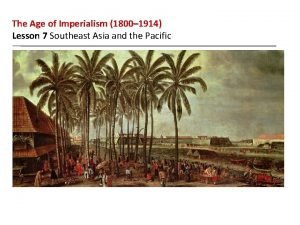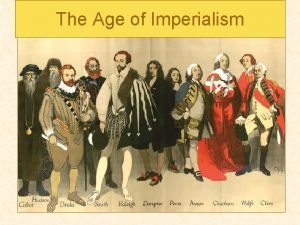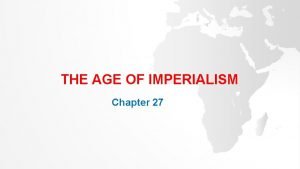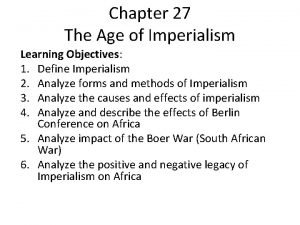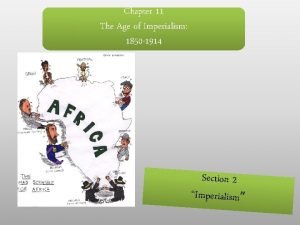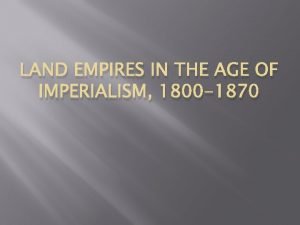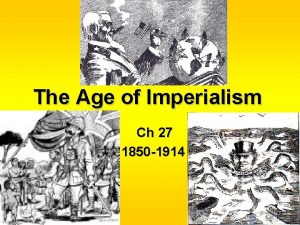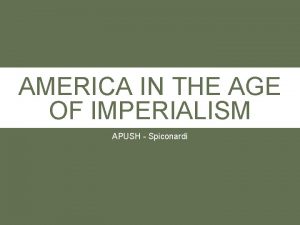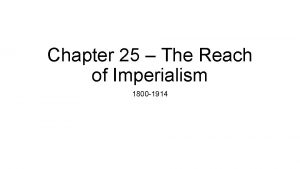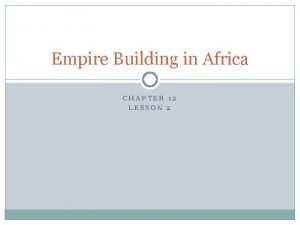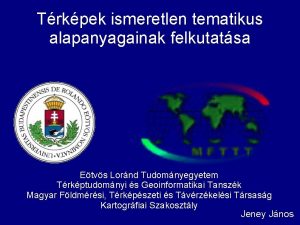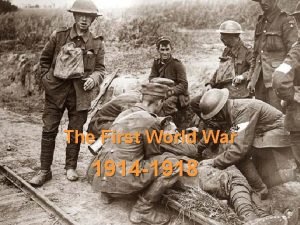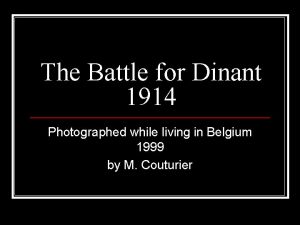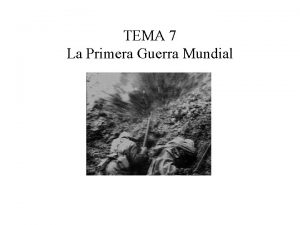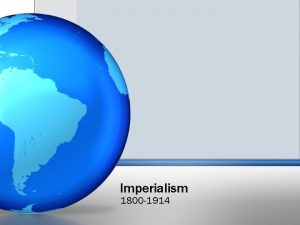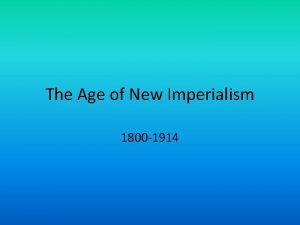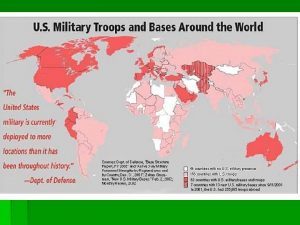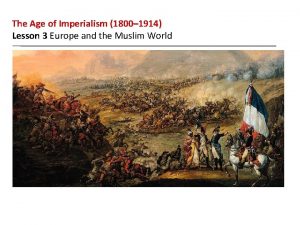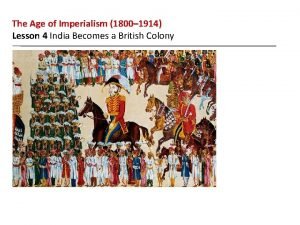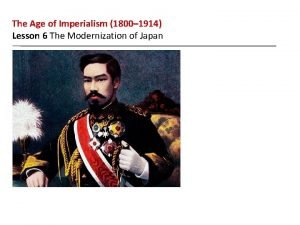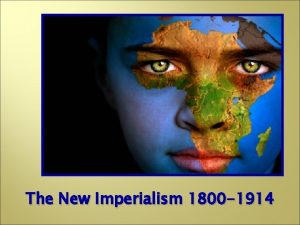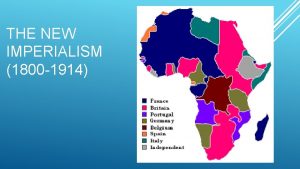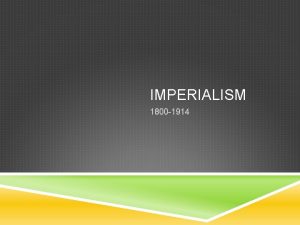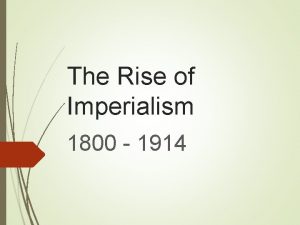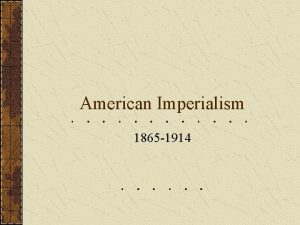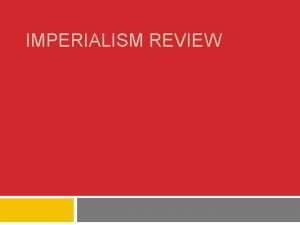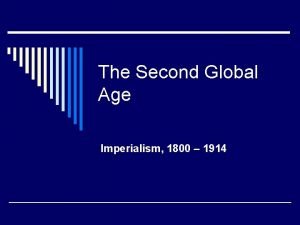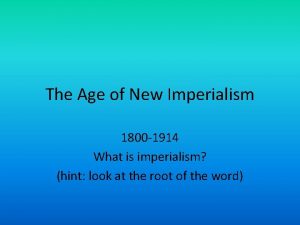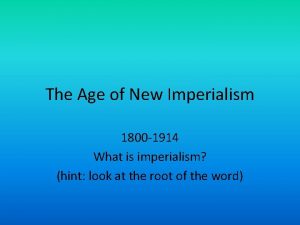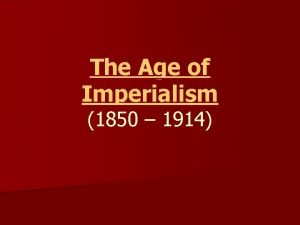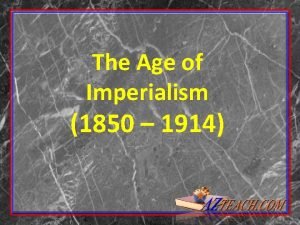The Age of Imperialism 1800 1914 Lesson 1





















- Slides: 21

The Age of Imperialism (1800– 1914) Lesson 1 The New Imperialism

The Age of Imperialism (1800– 1914) Lesson 1 The New Imperialism Learning Objectives • Explain the political, economic, and social causes of European imperialism. • Understand how technology and other factors contributed to the spread of imperialism. • Describe the characteristics of imperial rule. • Summarize the cultural, political, and social effects of imperialism.

The Age of Imperialism (1800– 1914) Lesson 1 The New Imperialism Key Terms • Imperialism • Protectorate • Sphere of influence,

Motivations for the New Imperialism The Industrial Revolution transformed the West. Advances in science and technology, industry, transportation, and communication provided Western nations with many advantages. Armed with new economic and political power, Western nations set out to dominate the world, building extensive overseas empires in the late 1800 s.

Motivations for the New Imperialism 1. Industrialization - Need for Resources Drives Further Expansion 2. Nationalism - Political and Military Causes 3. Humanitarianism – Europeans thought it was their duty to civilize and uplift African people Humanitarian and Religious Motives 4. Social Darwinism – Survival of the fittest applied to human behavior

Nationalism French Revolution and Napoleon spread Nationalism throughout Europe Continued by German and Italy unification Pride in one’s country was based upon industrial production, military strength, and size of empire (comparison tools)

Industrialization Increased population in Europe Great technological advances – military, transportation, communications Continued economic expansion requires more resources and markets

Humanitarianism / Social Darwinism Christian missionaries saw Africa and Asia as fertile ground for converts Cultural superiority – Europeans must “save” the rest of the world

Western Imperialism Spreads Rapidly From about 1870 to 1914, imperialist nations gained control over much of the world. Leading the way were soldiers, merchants, settlers, missionaries, and explorers. In Europe, imperial expansion found favor with all classes, from bankers and manufacturers to workers. Western imperialism expanded rapidly for a number of reasons.

Western Imperialism Spreads Rapidly Vulnerable Non-Western States - Ottoman Empire was weakening - Tribal wars in West Africa - Slave trade - Lack of centralized government Western Advantages - Strong economies, well-organized governments, powerful armies and navies. - Improved medicine - Bigger guns - Europeans also played rivals against one another

Western Imperialism Spreads Rapidly Western imperialists had powerful armies to keep control in their colonies. Here, British Army troops put down a rebellion in Bombay, India, in 1898. Support a Point of View with Evidence Does the artist who created this drawing favor the British or the Indians? What details in the image support your conclusion?

Scramble for Africa Prior to the Age of Imperialism, Europeans only controlled port towns (except for Portugal who had larger colonies) British took South Africa, Sierra Leone, and Gambia in the mid-1800 s

Scramble for Africa Between 1875 and 1900 European control of Africa went from 10% to 90% Only two nations, Liberia and Ethiopia remained independent

Scramble for Africa

Berlin Conference Tensions began to mount between rival European nations during scramble for Africa Conference called in 1884 by Bismarck of Germany to defuse disputes and set guidelines for colonization Conference in Berlin essentially divided up Africa – no African representatives were invited During division tribal territories and rivalries were not considered. Boundaries were drawn that divided tribes and coupled enemies together, leading to modern problems in Africa.

Types of Imperial Rule The leading imperial powers developed several kinds of colonial rule. Each of the different types reflected different goals for their colonies.

Types of Imperial Rule Direct Rule - French, German, Portuguese - Direct rule of locals - Imposed culture on local lands - Highly centralized Indirect Rule - British - Advisors made laws but local ruler carried out laws - Local rulers retained authority and reported to Britain - Mixed cultures

Types of Imperial Rule Other Types of Imperial Rule - Protectorate – local rulers left in place but were expected to follow guidance from European leaders. Cheaper then setting up colonies - Sphere of Influence – outside power claimed exclusive investment or trading privileges. Mostly seen in China - Company Rule – Company gains political and economic control over an area. East India Company

Quiz: Motivations for the New Imperialism Which of the following BEST summarizes the causes of imperialism in the late 1800 s? A. Westerners wanted to spread their religion, sell manufactured goods, and gain territory to compete with other countries. B. Westerners wanted markets for their goods and to attract non-Western workers for their factories. C. Westerners wanted to spread their religion and educate people. D. Westerners wanted to conquer as much land as they could because they needed more territory.

Quiz: Western Imperialism Spreads Rapidly How were Western nations able to expand their control over Asia and Africa so quickly? A. Their reliance on enslaved people gave them enough manpower to conquer Asian and African territories. B. They had strong governments, advanced economies and technology, and military power. C. They brought industry to Africa and Asia, setting up factories near the sources of resources. D. They adopted the traditions of the local peoples that they hoped to control.

Quiz: Types of Imperial Rule How do direct and indirect rule differ? A. Direct rule allowed for a European monarch to rule directly over the colony; indirect rule let the colonies rule themselves with no intervention. B. Direct rule set up a government ruled by the local people; indirect rule set up a government controlled by royal officials. C. Direct rule set up Westerners to rule over colonies; indirect rule allowed them to rule themselves with no intervention. D. Direct rule had European officials and soldiers to govern colonies; indirect rule used Western-appointed locals to govern colonies.
 Imperialism map 1914
Imperialism map 1914 Unit 5 lesson 7 the age of imperialism
Unit 5 lesson 7 the age of imperialism Stone age, bronze age iron age timeline
Stone age, bronze age iron age timeline Iron age bronze age stone age timeline
Iron age bronze age stone age timeline Africa 1890
Africa 1890 Old vs new imperialism chart
Old vs new imperialism chart When did hawaii get statehood
When did hawaii get statehood Chapter 27 building vocabulary the age of imperialism
Chapter 27 building vocabulary the age of imperialism Chapter 27 building vocabulary the age of imperialism
Chapter 27 building vocabulary the age of imperialism Chapter 11 the age of imperialism
Chapter 11 the age of imperialism Land empires in the age of imperialism
Land empires in the age of imperialism Chapter 27 the age of imperialism
Chapter 27 the age of imperialism White man's burden apush
White man's burden apush The reach of imperialism vocabulary activity
The reach of imperialism vocabulary activity Empire building in africa summary
Empire building in africa summary Lesson 1: the new imperialism
Lesson 1: the new imperialism What is shaded
What is shaded Európa térképe 1914-ben
Európa térképe 1914-ben Colonial empires 1914
Colonial empires 1914 Battle of dinant
Battle of dinant Balcanes 1914
Balcanes 1914 Topovsko pitanje
Topovsko pitanje

